“Dark and at times surreal, The Castle is often understood to be about alienation, bureaucracy, the seemingly endless frustrations of man’s attempts to stand against the system, and the futile and hopeless pursuit of an unobtainable goal.” Wikipedia’s description of Kafka’s novel might as well be describing our last few days.
Iskenderun to Port Said. Turkey to Egypt. One ferry, 40 truckers, 4 travellers with 4 passports and 2 vehicles, one purpose: get into Egypt.
We drove to Iskenderun after having called the shipping company, UN Ro-Ro, who said the ferry will sail on Saturday and we have a chance of being on it. On Saturday morning we got ready for the big adventure across the water, left our campsite and drove to Iskenderun. The misadventures began right there: the port is not sign-posted anywhere on the main road. We know the port is down by the sea, but how do we enter it? Which one of these roads leads to the right entrance? We accidentally almost drove into a military port, circled around twice, finally made it into some part of the port, had to get a security guard to help us find the right office. After much faffing around we finally got an escort to drive us to the customs office, who then pointed us in the direction of the office we needed.
“I remember during preparation for the trip that another traveller had posted a map with the entrance marked on it (Liman C). If my feet weren’t busy driving I’d have been kicking myself for forgetting to look that up again.” Jonathan.
As we drove towards the office, we spotted another over-lander vehicle. This must be the place, we thought. Soon after we were introduced to the boys in the Catoni office, and the people of the other over-lander came by: Humperdinck Jackman, travelling around the African continent to stop poaching with the charity Africality, and his travelling companion Cynthia Gibson. At this point it was still morning, everyone was smiling, Jonathan had to clear customs for the vehicle, and so on. We were told that the UN Ro-Ro has suspended its activities, but they have another boat they can put us on, which incidentally was not sailing to Damietta, as we had been told before, but instead to Port Said.
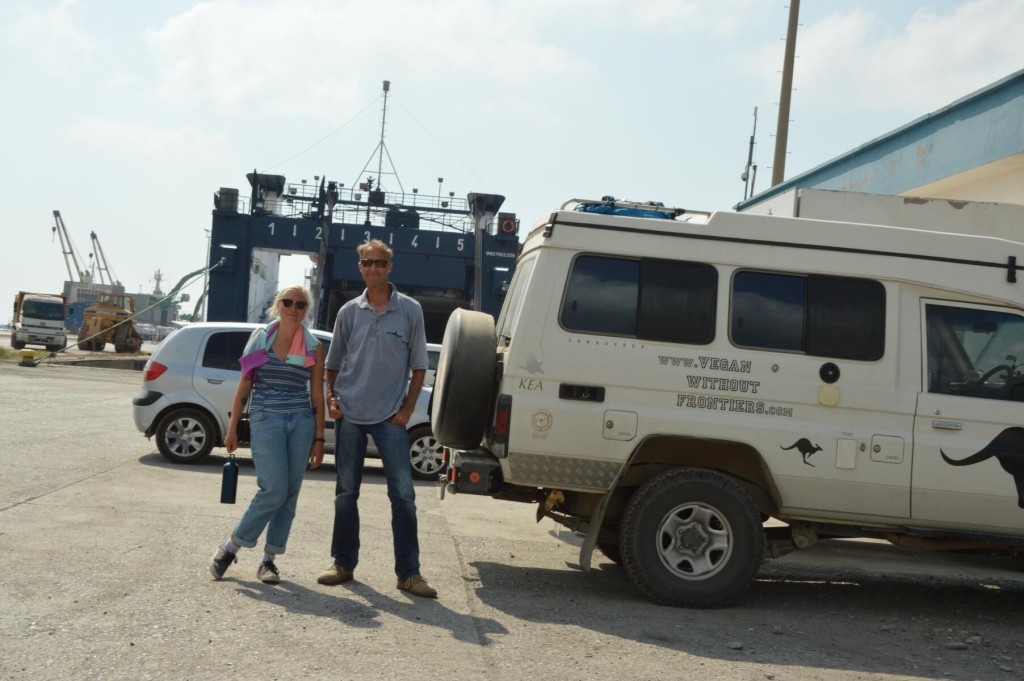
What followed was a whole day spent sitting around in the blistering sun, waiting for things to happen. But nothing was happening. We couldn’t even see the 40 promised trucks, or the truck drivers. The ferry was there but nobody else was, just us and some port officials. We spent the day talking, eating snacks, drinking coffee and juice, and waiting. Around 6pm things started happening, some trucks were being loaded onto the ferry, and around 8pm we were told we could drive on as the last vehicles. The ferry was definitely not luxurious: we were first given passenger rooms, which were spacious with a sink and bunk-beds, but the toilets were communal, needless to say, they were squat toilets.
The ferry didn’t leave shore up until about 10pm. That evening we were moved to “crew cabins” which were smaller, also with bunk beds, but they had private toilets. Soon after that we were told that dinner was being served, consisting of sliced tomatoes, olives, bread, cheese, and tea and coffee. Not bad for us, vegans (minus the cheese)! However, we soon discovered that the private toilets reeked badly of old plumbing. We flushed it several times with hot water, and that worked for a bit.
The next 36+ hours were quite miserable. The private toilets started reeking of rotten eggs the next morning, so we had to rescue our things from it and put a towel under the door. The ferry was very hot, outside and inside. The rocking motion soon became a bit much for my stomach, as I got quite nauseous. The food only got progressively worse. We were served various lumps and scoops of stuff, most of it creamy or with meat. Jonathan and I lived on bread, rice and our own tomato packet soup for the rest of the ferry time. I was juggling being nauseous and starving.
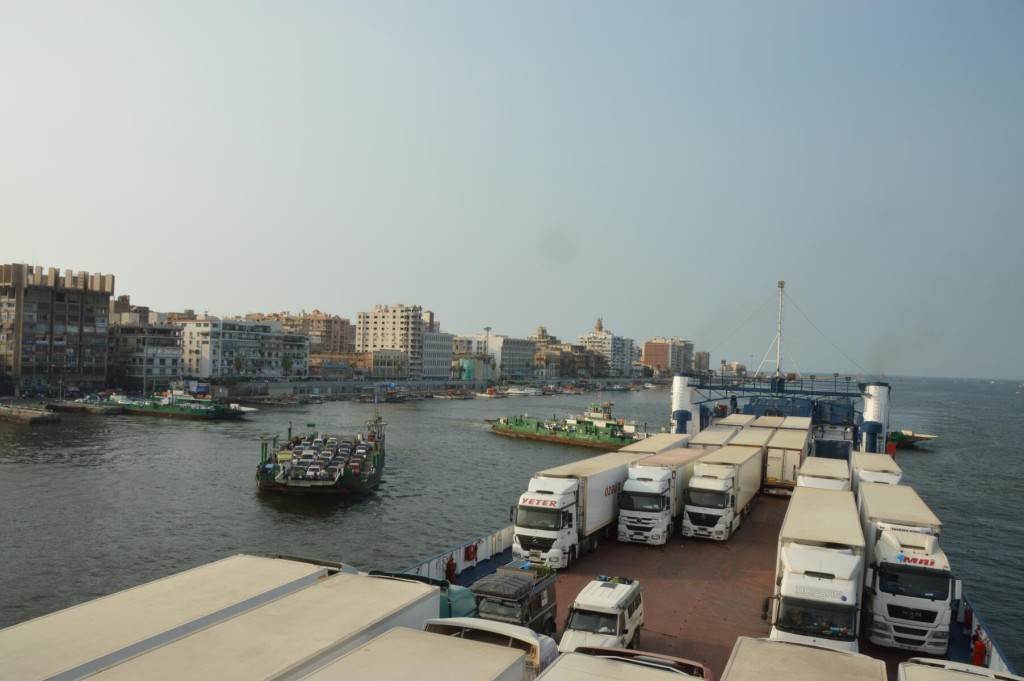
Monday morning we arrived in Port Said. And by “arrived” I mean we spent the day anchored nearby while we waited our turn to be docked. Finally as the sun was setting, we made it to shore. By “shore” I mean all the people were let out from the ferry onto the ferry ramp and the little area around it, to be attacked by people selling sim cards that semi-worked and charging ridiculous amounts of money for them. Everybody needed internet at that point, so we fell into that trap. We still didn’t have our passports by the way – and nobody knew exactly who or which authority had them. We sat around on the hard steel for hours in the dark, waiting for something to happen. Eventually a guy called Sherif showed up and tried to help us by figuring out what was going on and phoning people. We met the immigration people by chance for two seconds, and were told there was no problem. Then we were told to drive off the ferry. The real nightmare began then.
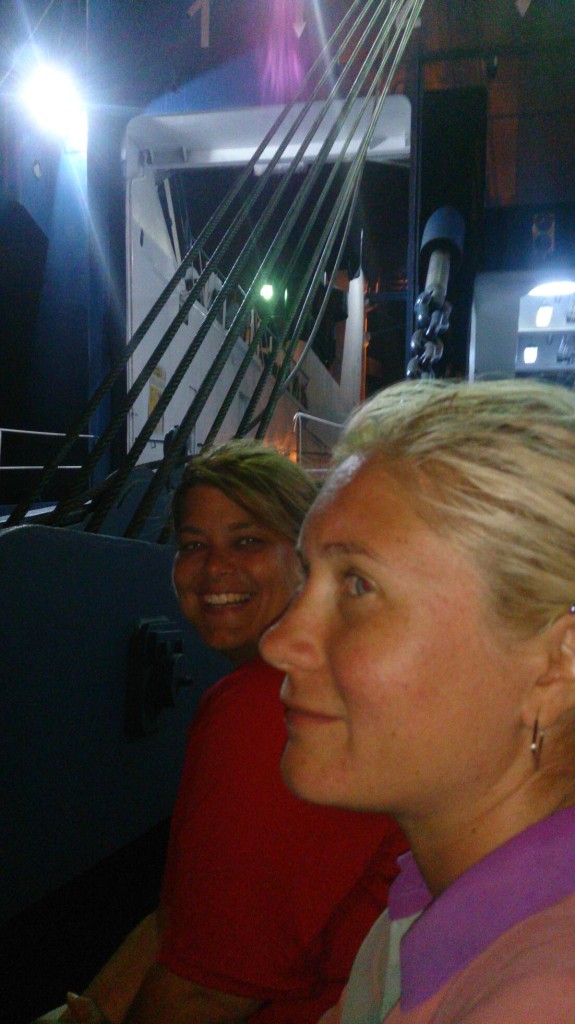
We drove off and had no idea where to go, we were getting directed by people who had no idea who we were, through the shipping container yard, full of screeching trucks, towing trucks, cars, screaming people, mopeds, all done in semi-darkness and without any signs of anything around, just containers upon containers. We were directed into a gated area full of Turkish trucks (not the ones we were on the ferry with), a very very dark ominous area with no lighting, no shelter, no food or water, no toilets, nothing at all. Forget being spooky, this was a place people get thrown in to be shot in movies. Or refugees get thrown in to rot forever. We still didn’t have our passports and we had no idea what or who had them and when we would get them. We couldn’t leave the port, we had no idea where to go, and nobody spoke any English or any other language that any of us combined could understand. The mood hit ultimate low for me at this point. I am not going to lie, I broke down and cried in the front seat. It was the worst moment of my entire life. Writing about this and reliving the memory is bringing tears to my eyes as I write this.
Eventually somebody came by and told us there was a problem with our visas: we couldn’t get visas upon arrival at this port because it wasn’t a tourist port. This is of course a complete lie, because every port of entry to Egypt must provide visas upon entry. I lost it a bit on this particular guy, and I am sorry to say, on some of our companions also. The guy told us we could go sleep on the ferry and we might be shipped back to Turkey the following day. At this point anything was better than that gated container yard. We drove back to the ferry, but it was being loaded with new trucks and we weren’t allowed on it until they were done. We decided to sleep in our cars just outside the ferry, at least there were more people around and more lights. Still surrounded by containers, homeless looking people, rabid scary dogs, massive trucks… I don’t think anybody really slept that night.
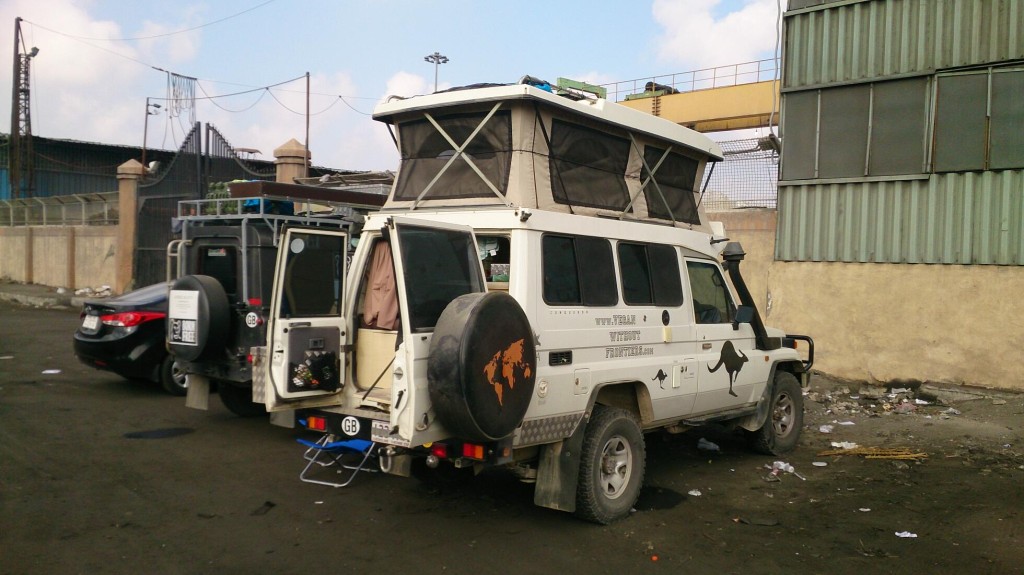
The next day nothing improved. We still didn’t have our passports for hours. We had no one to even call or ask what was going on. We had no shelter other than our hot cars, barely any shade, no water or food, again no facilities whatsoever. We could go up to the ferry for toilets but that was about it. The mood was beyond low at this point: it was frustrated, annoyed, angry. Sherif appeared out of nowhere and told us that the Admiral was phoning the shipping company to help us out, or something of that sort. Perhaps Jonathan can explain this all better. We were still lost Westerners with no hope of getting out. Somebody took pity on us and brought us water and some snacks, and then turned out to be an absolute angel helping us out with customs later on.
“I’m not going to go into the details of who played what part here, as some of them went beyond the call of duty and put themselves in vulnerable positions to help us out. There was basically a battle between reason and extortion going on, between friends and enemies, and meanwhile we were left in the dirt and rubbish of the container port to bake in the sun. If it weren’t for a few good people, we might still be there, or be heading home due to deportation or being bankrupted by the vultures.” Jonathan.
Some guy came up to us with passports and our visas were stamped into them. Each visa cost $25. He was asking for $100 for each passport plus $500 for who knows what, and that was even before the agent for customs clearance announced how much he wanted from us. Thankfully the passport guy was kind of dumb, because I managed to trick him into giving us our passports but then we just held on to them and didn’t give him the ridiculous amount he was asking. One small win in the big battle. Eventually we got rid of both of them and our angel friend showed us where we could go to start clearing customs. We drove around the extremely confusing port, stopping and asking and going back and forth. Eventually we found the correct office and Jonathan and Humperdinck went in to try and sort some stuff out.
Some time after (no idea how many hours…. hours have turned into days by then) we finally got out of the port (without our cars, we can’t get them still) and found a hotel. After days of no food, no facilities, all of the human stress imaginable on our shoulders, we collapsed on the beds and I slept for 12 hours. I didn’t even want to get up to get dinner, even though we hadn’t eaten properly in days.
The next day was a holiday so there was nothing we could do to get out of this hellhole, so we just waited. The day was spent walking around, scavenging for some food (Ramadan is still in full effect, and in Egypt it is very strict. You can’t find a single restaurant or cafe open or serving food), playing cards and drinking non-alcoholic beer. In the evening we tried out an Asian restaurant which served real alcohol, and we had our first full real vegan meal in probably a week. It was a strange night: there were two Russian men who worked for some shipping company or some such, basically they spend most of their time at sea. They were offering vodka (of course) and advice. The vodka was vile and probably shouldn’t have been drunk, but the company was pleasant enough.
The next day Jonathan and Humperdinck had to go back to the port, leaving the “women” behind. Probably for the best, because I spent the morning dry heaving over the toilet, and I don’t think the vodka was the only culprit here: eating a large meal after half-starving for a week was probably not the best, plus the stress and the agony.
“Yup, throwing up in the hotel room was luxury – I was similarly afflicted but found myself trying to discreetly chuck in a corner of the ubiquitous decaying rubbish outside the police station we were at on some wild goose chase. For me it was just vodka and the hot sun.” Jonathan.
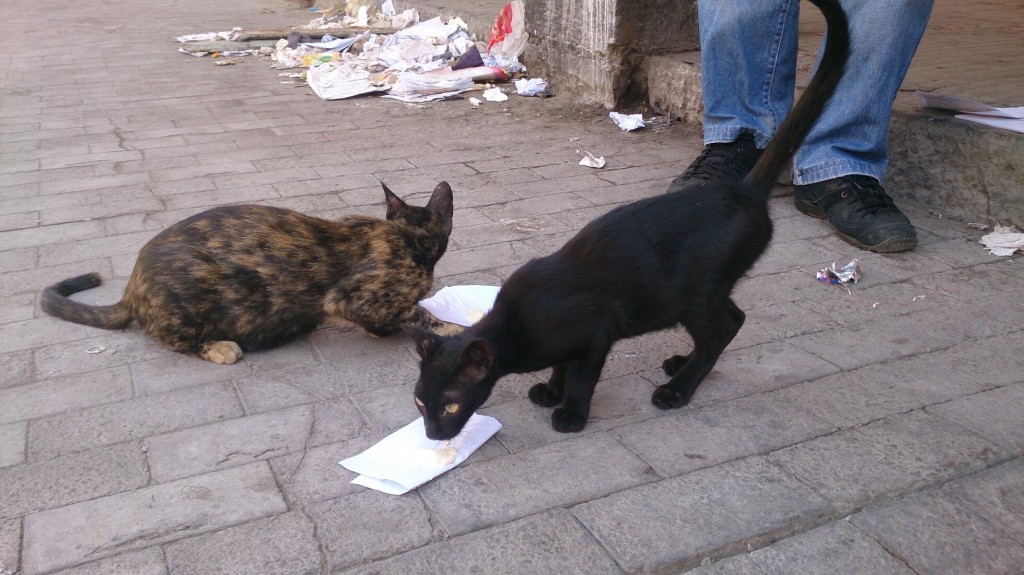
The day spent at the port was not any better, the nightmare did not lift one bit. The problem is that nobody knows what fees we should be paying, they seem to be making up numbers and fees on the spot, and doubling and tripling after confirming the original price. The whole thing is just absolutely ridiculous and there seems to be no end to this. We paid yesterday some crazy fees (not as crazy as we originally were asked), but the cars are still at the port and we are still at the hotel. Today is another holiday so nothing will get done. Tomorrow, hopefully tomorrow, we can clear customs and drive out of here. But as in a Kafka novel, I think there might be no end to our nightmares.

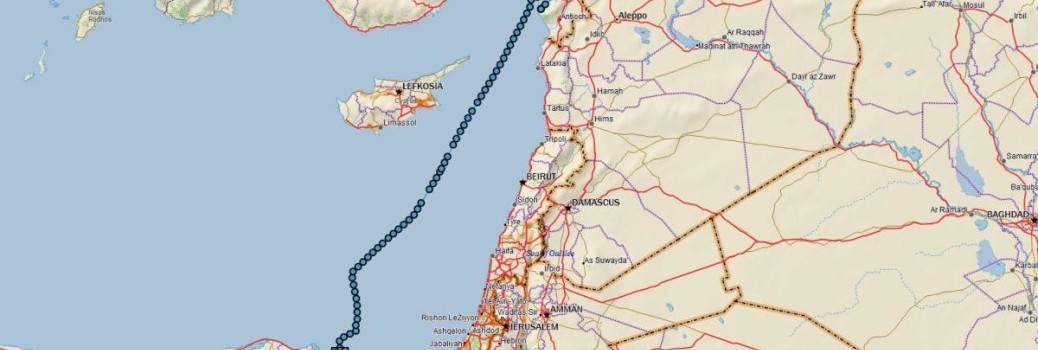
Read twice, horrible, liked Chayka’s comment about the luxury of vomiting in the hotel room vs outside the police station.
I really wish you would leave all that shit in Port Said and move on.
I will translate this post for your non-English speaking followers. I think you don’t mind.
(I’m keeping worried about you)
[Это перевод без прикрас]
Сказ о двух городах
«Темный и подчас сюрреалистичный, Замок выступает символом отчужденности, бюрократического кошмара, источником нескончаемой фрустрации и безнадежности, не отпускающие человека в его противостоянии системе в тщетной погоне за недостижимой целью», — так Wiki описывает одноименный роман Кафки, что есть прекрасное описание наших злоключений последних дней.
Искендерун – Порт-Саид. Из Турции в Египет. Один паром, 40 грузовиков, 4 путешественника с 4-мя паспортами и 2-мя машинами с одной целью – переправиться в Египет.
Мы поехали в Искендерун после звонка в пароходную компанию «UN Ro-Ro», где нам сказали, что паром отправляется в субботу, и у нас есть шанс на него попасть. В субботу утром мы собрались, покинули кемпинг и двинули в путь на Искендерун, полностью готовые к морскому путешествию. Наши злоключения начались сразу: нигде по дороге не было ни одного указателя, как проехать в порт. Мы знали, в какой стороне порт, но как туда попасть? Какая из дорог ведет к нужному въезду? Случайно, мы чуть не зарулили в военный порт, кружили и кружили, пока, наконец, не заехали в какую-то часть порта, где охранник помог нам найти нужный офис. Неимоверными усилиями нам удалось заполучить провожатого, проводившего нас к офису таможни.
Чайка: «Я помню, что во время подготовки к путешествию я изучал карту, постнутую кем-то в интернете, с отмеченными на ней въездами в порт (Лиман С). Если бы мои ноги не были заняты, пока я вел машину, я бы дал себе изрядного пинка за то, что забыл заглянуть в карту еще раз».
Подходя к офису, мы заметили еще один лендровер и решили, что попали как раз туда, куда нам нужно. Тут нас представили работникам Катони офиса, и мы познакомились с владельцами лендровера: Хампердинк Джекмен из благотворительности «Африкалити», путешествующий вокруг африканского континента, чтобы противостоять браконьерству на континенте, и его спутница Синтия Гибсон. Было еще утро, все улыбались, Чайка занимался таможенными и прочими формальностями. Нам сказали, что «UN Ro-Ro» приостановил свою деятельность, но нас могут погрузить на другой паром, который, правда, плывет не в Думьят, как нам сказали сначала, а так случилось, что в Порт-Саид.
А дальше был целый день сидения под палящим солнцем, ожидая, чтоб хоть что-то произошло. Но ничего не происходило. Мы не видели ни сорока обещанных грузовиков, ни их водителей. Парома также нигде не было видно, только мы слонялись вокруг, да несколько портовых служащих. Мы провели день в разговорах, жевали, пили кофе и сок и ждали. Около 6-ти вечера началось какое-то шевеление, паром начал загружаться, и в районе 8-ми часов нам было сказано, что мы можем заехать на паром в последнюю очередь. Паром был определенно не люкс: сначала нам дали просторные пассажирские каюты с раковиной, двухъярусными кроватями, но туалет предполагался общественный и, разумеется, чтобы сидеть на корточках.
Паром отчалил только около 10-ти вечера. Тем же вечером мы переместились в «экипажные каюты», которые были поменьше и тоже с ярусными кроватями, но с туалетом. Скоро нас позвали на ужин, который состоял из помидоров, оливок, хлеба, сыра, чая и кофе. Недурно для нас, веганов (за исключением сыра)! Однако мы очень быстро поняли, что из нашего туалета дико воняет, потому что плохо смывает. Мы пролили его несколько раз горячей водой, и вроде бы это помогло.
Следующие 36 с лишним часов были ужасны. Наутро наш туалет стал отчаянно вонять тухлыми яйцами, мы забрали оттуда все свои вещи и заблокировали его, подсунув под дверь полотенце. На пароме было жарко внутри и снаружи. От качки стало тошнить и схватывать живот. Еда становилась все хуже и хуже. Нам подавали какие-то комки и черпаки чего-то по большей части жижеобразного или мясо. Все оставшееся время мы с Чайкой держались на хлебе, рисе и своих запасах томатного супа в пакетах. Я балансировала на грани тошноты и голода.
В понедельник утром мы прибыли в Порт-Саид. «Прибыли» означает, что день мы провели на якоре вблизи порта, ожидая своей очереди попасть в доки. Наконец, как солнце село, мы пристали к берегу. «Пристали к берегу» — это значит, что мы оказались на корабельных сходнях, в узком пространстве, атакованные торговцами сим-картами, сомнительного происхождения и за дикие деньги. К тому моменту все жаждали заполучить интернет, поэтому клюнули на эту удочку. К тому же у нас все еще не было паспортов на руках, и никто не знал точно, в чьем они владении. Мы долго сидели на голом железе в темноте, ожидая хоть каких-то действий. В конце концов, нарисовался парень, назвавшийся Шариф, и попытался помочь нам понять, объяснив, что вообще происходит, и названивал разным людям. Довольно быстро объявились люди из иммиграционного офиса и заверили, что все в порядке. Потом нам велели уезжать с парома. И тут начался настоящий кошмар.
Мы покинули паром и не имели ни малейшего понятия, куда мы едем, ведомые людьми, которые не знали, кто мы такие, через погрузочно-разгрузочную площадку, запруженную грузовиками, кранами, кричащими людьми, снующими мопедами… Все это в полутьме и без единого опознавательного знака, только ряды контейнеры вокруг. Нас провели в огороженное пространство, заполненное турецкими грузовиками (вовсе не теми, что плыли с нами пароме), очень темное и зловещее: ни света, ни укрытия, ни еды, ни воды, ни туалета – ровным счетом ничего. Дом с приведениями – детские шалости! Это же было место, куда в кино затаскивают людей, чтобы убивать. Или беженцев, чтобы забыть о них навсегда. Мы не могли покинуть порт, мы не имели понятия, куда идти, и никто вокруг не говорил ни по-английски, ни на одном из языков, доступных нашему совместному знанию. Настроение упало – ниже некуда. Признаюсь: тут я сломалась, расплакалась прямо на своем переднем сиденье. Самый ужасный момент в моей жизни. Даже сейчас, когда пишу и вспоминаю обо всем этом, опять слезы, почти капают.
Наконец кто-то пришел к нам и сказал, что у нас проблема с визами: нам не могут их поставить тут при въезде, потому что тут не туристический порт. Это, конечно же, была ложь, потому что каждый порт в Египте должен ставить визы по прибытии. Тут я не выдержала и сорвалась на этого парня и, каюсь, досталось и одному из наших. Нам сказали, что мы можем переночевать на пароме, и что, может быть, на следующий день нас переправят назад в Турцию. На тот момент все что угодно было лучше, чем этот запертый контейнерный двор. Мы направились назад к парому, но на него уже началась погрузка, и нас не пускали туда, пока не кончат. Мы решили лечь спать в своих машинах рядом с паромом, тут хотя бы было светло, и сновали люди. В окружении контейнеров, каких-то бродяг, собак с признаками бешенства, массивных грузовых машин было трудно заснуть, не думаю, что кто-то из нас мог спать той ночью.
На следующий день наши дела не сдвинулись. Мы сидели без паспортов. Некому было позвонить, некого было спросить, что происходит. Никакого укрытия, кроме наших раскаленных машин, ни тенечка, где спрятаться, ни воды, ни еды, никаких прочих жизненных средств. Все, что нам было доступно, – это возможность пользоваться туалетом на пароме. Состояние было – отвратительнее некуда: мы были подавлены, раздражены и негодовали. Вдруг откуда ни возьмись, появился Шариф и сообщил нам, что Адмирал (капитан нашего парома) звонил в пароходную компанию, чтоб помочь нам или что-то в этом роде. Чайка может лучше объяснить. Мы чувствовали себя западными людьми, загнанными в угол, без всякой надежды вырваться отсюда. И один человек пожалел нас и принес нам воды и еды, и потом стал нашим ангелом, помогавшим справляться с таможенными акулами.
Чайка: «Не буду вдаваться в подробности, кто сыграл и какую именно роль в нашем деле, поскольку некоторые действовали сверх своих полномочий и поставили себя в уязвимое положение, помогая нам выбраться из нашей ситуации. В целом, тут было противостояние здравого смысла и вымогательства, друзей и недругов, а меж тем мы торчали на самом пекле на грязной погрузочной площадке среди куч мусора. Если бы не нашлись добрые люди, мы бы до сих пор сидели там, или бы плыли домой, будучи депортированы или ограблены этими хищниками».
Пришел человек с нашими паспортами и шлепнутыми в них визами. Каждая стоила 25 долларов. Человек стал просить 100 долларов за каждый паспорт плюс еще 500 непонятно за что. И еще было неизвестно, сколько запросит от нас агент, помогающий с таможней. К счастью, человек с паспортами оказался лохом, и мне удалось выманить у него наши паспорта, не заплатив ему той дикой суммы, что он запросил. Маленькая, но победа в большом сражении. Мы как-то избавились от паспортного дилера и таможенного посредника, а наш друг-ангел показал, куда идти, чтоб начать таможенные процедуры. Мы ездили взад и вперед по этому запутанному порту, бесконечно останавливаясь и расспрашивая. Наконец нашли нужный нам офис, где Чайка и Хампердинк попытались разобраться с нашими делами.
Наконец-то мы вырвались из порта (ощущение времени потерялось: спустя несколько часов или суток), оставив там машины, и пошли искать какой-нибудь отель. Проведя сутки впроголодь, без туалета и вне нормальных человеческих условий, мы рухнули на кровати и уснули. Я проспала 12 часов, не просыпаясь даже на обед.
Следующий день тут был выходным, поэтому мы ничего не могли делать, кроме как торчать в этой дыре и ждать. Мы бродили, рыская в поисках еды (Рамадан был в самом разгаре, а в Египте ему следуют очень строго; мы не могли найти ни одного ресторана или кафе, где бы поесть), играли в карты и пили безалкогольное пиво. Вечером мы зашли в азиатский ресторан, где продавали алкоголь, где мы смогли поесть наконец-то нормальной веганской еды впервые за последнюю неделю. Это было странное место: там было двое русских мужчин, работающих на какую-то пароходную компанию или что-то вроде того, во всяком случае, большую часть времени они проводили в море. Они предложили нам (конечно же!) выпить водки и давали разные советы. Водка была ужасна, и, может, не стоило ее пить, но компания была вполне приятная.
На следующий день Чайка и Хампердинк должны были идти снова в порт, одни, без «женского сопровождения» на сей раз. Наверное, это было к лучшему, потому что я провела утро, склонившись над туалетом, и, думаю, не только потому, что водка, но много еды после полуголодной недели плюс стресс и агония последних дней – и мой организм не справился все переварить.
Чайка: «Да уж, это роскошь – вытошнить все в гостиничном туалете. Я же просто время от времени выскакивал из полицейского участка и исторгал то, что просилось наружу, на углу в бачок с гниющими отходами под пристальным наблюдением диких гусей».
День, проведенный в порту, обернулся ничуть не лучше, кошмары не ослабевали. Проблема в том, что никто не знал, по какому тарифу мы должна платить, и, казалось, они измышляли цифры и суммы на ходу, при этом тут же удваивая и утраивая цену. Это было все нелепо, и безобразию этому не было конца. Вчера мы заплатили безумную сумму (и все же не такую безумную, как они просили вначале), но наши лендроверы все еще стоят в порту, а мы зависаем в отеле. Сегодняшний день – опять выходной, поэтому ничего нельзя сделать. Завтра, надеемся, мы сможем пройти таможенную проверку и убраться отсюда. Но, как и герой Кафки, я думаю, конца не будет этому кошмару.